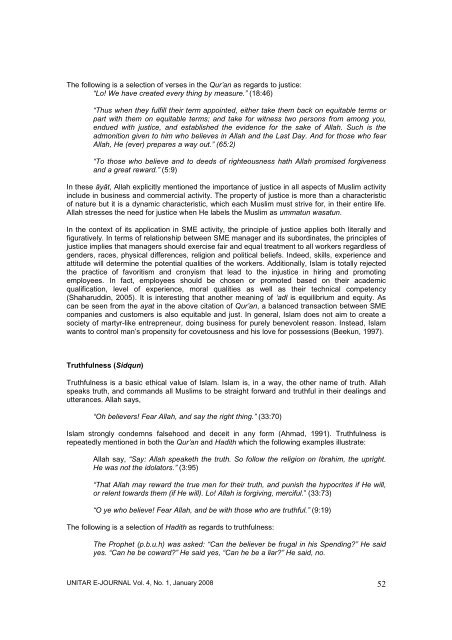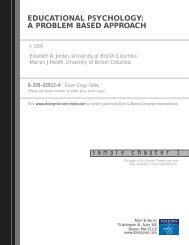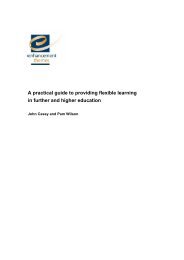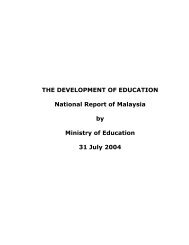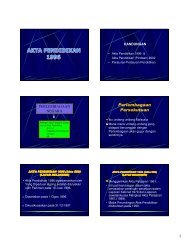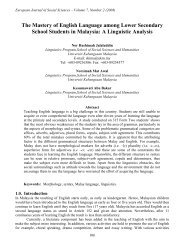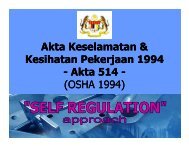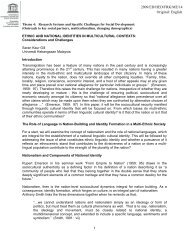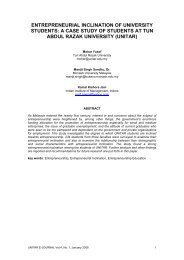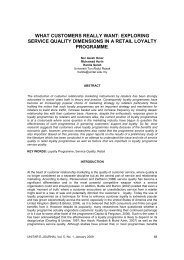An Analysis of Islamic Ethics in Small and Medium Enterprises (SMEs)
An Analysis of Islamic Ethics in Small and Medium Enterprises (SMEs)
An Analysis of Islamic Ethics in Small and Medium Enterprises (SMEs)
Create successful ePaper yourself
Turn your PDF publications into a flip-book with our unique Google optimized e-Paper software.
The follow<strong>in</strong>g is a selection <strong>of</strong> verses <strong>in</strong> the Qur’an as regards to justice:“Lo! We have created every th<strong>in</strong>g by measure.” (18:46)“Thus when they fulfill their term appo<strong>in</strong>ted, either take them back on equitable terms orpart with them on equitable terms; <strong>and</strong> take for witness two persons from among you,endued with justice, <strong>and</strong> established the evidence for the sake <strong>of</strong> Allah. Such is theadmonition given to him who believes <strong>in</strong> Allah <strong>and</strong> the Last Day. <strong>An</strong>d for those who fearAllah, He (ever) prepares a way out.” (65:2)“To those who believe <strong>and</strong> to deeds <strong>of</strong> righteousness hath Allah promised forgiveness<strong>and</strong> a great reward.” (5:9)In these āyāt, Allah explicitly mentioned the importance <strong>of</strong> justice <strong>in</strong> all aspects <strong>of</strong> Muslim activity<strong>in</strong>clude <strong>in</strong> bus<strong>in</strong>ess <strong>and</strong> commercial activity. The property <strong>of</strong> justice is more than a characteristic<strong>of</strong> nature but it is a dynamic characteristic, which each Muslim must strive for, <strong>in</strong> their entire life.Allah stresses the need for justice when He labels the Muslim as ummatun wasatun.In the context <strong>of</strong> its application <strong>in</strong> SME activity, the pr<strong>in</strong>ciple <strong>of</strong> justice applies both literally <strong>and</strong>figuratively. In terms <strong>of</strong> relationship between SME manager <strong>and</strong> its subord<strong>in</strong>ates, the pr<strong>in</strong>ciples <strong>of</strong>justice implies that managers should exercise fair <strong>and</strong> equal treatment to all workers regardless <strong>of</strong>genders, races, physical differences, religion <strong>and</strong> political beliefs. Indeed, skills, experience <strong>and</strong>attitude will determ<strong>in</strong>e the potential qualities <strong>of</strong> the workers. Additionally, Islam is totally rejectedthe practice <strong>of</strong> favoritism <strong>and</strong> cronyism that lead to the <strong>in</strong>justice <strong>in</strong> hir<strong>in</strong>g <strong>and</strong> promot<strong>in</strong>gemployees. In fact, employees should be chosen or promoted based on their academicqualification, level <strong>of</strong> experience, moral qualities as well as their technical competency(Shaharudd<strong>in</strong>, 2005). It is <strong>in</strong>terest<strong>in</strong>g that another mean<strong>in</strong>g <strong>of</strong> ‘adl is equilibrium <strong>and</strong> equity. Ascan be seen from the ayat <strong>in</strong> the above citation <strong>of</strong> Qur’an, a balanced transaction between SMEcompanies <strong>and</strong> customers is also equitable <strong>and</strong> just. In general, Islam does not aim to create asociety <strong>of</strong> martyr-like entrepreneur, do<strong>in</strong>g bus<strong>in</strong>ess for purely benevolent reason. Instead, Islamwants to control man’s propensity for covetousness <strong>and</strong> his love for possessions (Beekun, 1997).Truthfulness (Sidqun)Truthfulness is a basic ethical value <strong>of</strong> Islam. Islam is, <strong>in</strong> a way, the other name <strong>of</strong> truth. Allahspeaks truth, <strong>and</strong> comm<strong>and</strong>s all Muslims to be straight forward <strong>and</strong> truthful <strong>in</strong> their deal<strong>in</strong>gs <strong>and</strong>utterances. Allah says,“Oh believers! Fear Allah, <strong>and</strong> say the right th<strong>in</strong>g.” (33:70)Islam strongly condemns falsehood <strong>and</strong> deceit <strong>in</strong> any form (Ahmad, 1991). Truthfulness isrepeatedly mentioned <strong>in</strong> both the Qur’an <strong>and</strong> Hadith which the follow<strong>in</strong>g examples illustrate:Allah say, “Say: Allah speaketh the truth. So follow the religion on Ibrahim, the upright.He was not the idolators.” (3:95)“That Allah may reward the true men for their truth, <strong>and</strong> punish the hypocrites if He will,or relent towards them (if He will). Lo! Allah is forgiv<strong>in</strong>g, merciful.” (33:73)“O ye who believe! Fear Allah, <strong>and</strong> be with those who are truthful.” (9:19)The follow<strong>in</strong>g is a selection <strong>of</strong> Hadith as regards to truthfulness:The Prophet (p.b.u.h) was asked: “Can the believer be frugal <strong>in</strong> his Spend<strong>in</strong>g?” He saidyes. “Can he be coward?” He said yes, “Can he be a liar?” He said, no.UNITAR E-JOURNAL Vol. 4, No. 1, January 2008 52


